Some bird species feed their young for up to eight weeks after they hatch. The usual time is about two and a half to four weeks for most baby birds. This shows how important it is to take care of them. Baby birds really need high-energy foods, mostly insects, to grow right.
This guide will help you understand the diet of baby birds. You’ll learn what to feed them, how to make their food, and when to get help. With these tips, you can look after orphaned or sick baby birds well.
Key Takeaways:
- Baby birds have specific dietary requirements that vary by age and species.
- Insects and protein-rich foods should make up the bulk of a baby bird’s diet.
- Feeding baby birds is a labor-intensive task, requiring frequent feedings throughout the day.
- Proper hygiene and handling practices are essential to prevent the spread of disease.
- Certain bird species have unique dietary needs that may require specialized care.
Introduction to Feeding Newborn Birds
Feeding newborn birds is both delicate and rewarding. You need to know their exact food needs. They rely completely on us as they grow and develop.
Importance of Proper Nutrition for Baby Birds
Baby birds need different food from adults. Their young bodies need lots of proteins, fats, vitamins, and minerals. The right diet at the right stage is vital for their health.
Signs that a Baby Bird Needs Feeding
It’s hard to know when a baby bird is hungry. Look for clues like not being able to fly, messy feathers, or looking sad. Acting fast when you see these signs is key because young birds are very fragile.
To help baby birds, knowing how to feed them right is essential. Learn the best methods and use proper resources. This way, you can give them the best care when they need it most.
Identifying Nestlings vs. Fledglings
It’s important to know if a baby bird you find is a nestling or a fledgling. A nestling is a very young bird with no feathers. It cannot leave the nest. Fledglings are a bit older. They have feathers and are learning to fly outside the nest.
Nestlings are easy to spot. They’re soft and fluffy with no feathers. They also can’t grip well. If you find one, try to put it back in the nest. The parents probably take care of it there.
Fledglings have some feathers and are a bit bigger. They may jump or perch near the nest. It’s best not to put them back in the nest. Their parents are likely still looking after them.
| Characteristic | Nestlings | Fledglings |
|---|---|---|
| Feather Development | Sparsely feathered or downy | Mostly feathered |
| Mobility | Unable to hop or grip tightly | Can perch and hop around |
| Nest Location | Still in the nest | Out of the nest, being cared for by parents |
It’s crucial to know if a baby bird is a nestling or a fledgling. Helping a nestling back to its nest is usually best. But for a fledgling, it’s better to leave it be, unless it’s hurt.

Learning to tell nestlings from fledglings matters. It helps you make the right choice for the bird’s safety. With this knowledge, you can protect these fragile birds as they grow.
When to Intervene and When to Leave Baby Birds Alone
Knowing when to help baby birds is key. Often, their parents are close by, taking care of them. So, don’t step in unless you’re sure they need your help. Only move a baby bird if it’s hurt or truly alone.
Assessing a Baby Bird’s Condition
If a baby bird seems weak, tired, or hungry, it might need human assistance. Signs include looking around, fluffy feathers, or not yet flying.
But, fledglings may seem helpless. These birds are learning to fly and often leave the nest early. They’re usually not abandoned and should be left alone if not in immediate danger.
Contacting Wildlife Rehabilitation Centers
If you think a baby bird needs help, contact a wildlife rehab center. They are trained to care for them safely. Trying to help on your own can do more harm.
Most found baby birds are fledglings. They are not abandoned and usually do fine if left alone. Knowing the right time to step in is the best way to help wildlife.
“If a bird is sick, wounded, or at risk, it is important to seek medical help immediately by contacting a rehabber, state wildlife agency, or veterinarian.”
What to Feed Newborn Birds
Caring for baby birds requires a special diet to help them grow. They need lots of protein for energy. Good foods for them include small insects, like chopped worms, and fully cooked eggs.
Protein-Rich Foods for Baby Birds
Protein is key for baby birds to grow fast and heal. Some top protein foods for them are:
- Chopped, cooked worms
- Crushed crickets and grasshoppers
- Mealworms
- Cooked, finely chopped chicken or turkey
- Hard-boiled eggs, finely chopped or mashed
Importance of Insects and Larvae
For baby birds, insects and larvae are vital. They offer lots of protein and needed vitamins and minerals. Mealworms, crickets, and mosquito larvae are good food for them.
Besides insects, bird formulas or supplements can be helpful. It’s smart to talk to a wildlife expert for the best plan. This is especially true for choosing the right diet for the bird’s species.
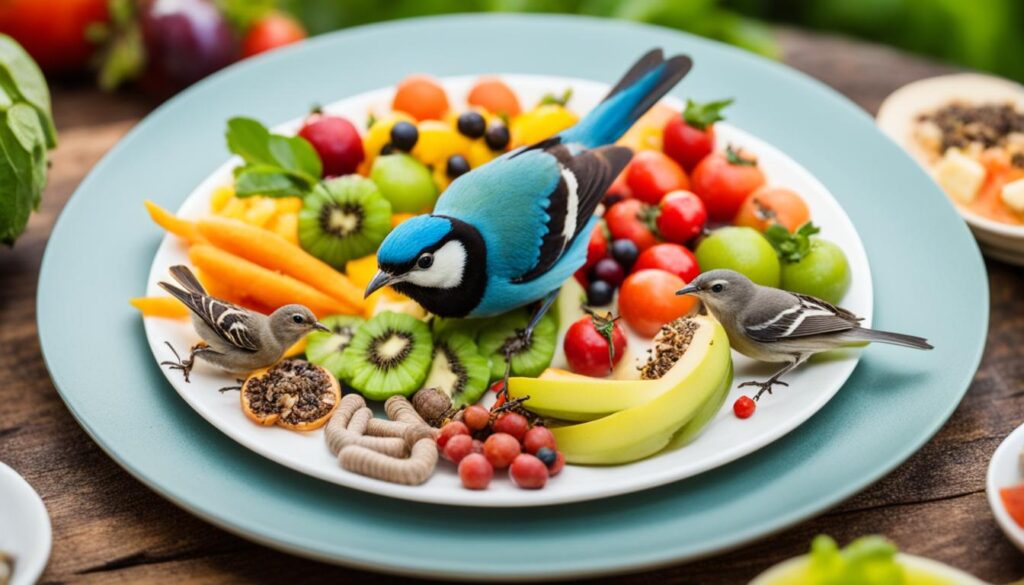
“Proper nutrition is crucial for the health and well-being of baby birds. A diet rich in protein and insects can help ensure they grow strong and thrive.”
Feeding baby birds is detailed work. Food needs to be the right size, soft, and warmed correctly. The right feeding makes sure they become healthy adults.
Preparing Baby Bird Food
When looking after baby birds, making the right food matters a lot. You need to soften hard foods and cut up bigger foods. This care in preparing their meals helps make sure they get all the nutrients they need.
Softening and Chopping Food
Bird seed and pellets need a little water to become soft and easy to eat. This way, the baby bird can take in and digest their meals better. Always cut larger food, like insects or fruit, into small, safe pieces.
Proper Food Portions and Temperatures
Think about the size and age of the baby bird when serving food. It’s crucial to not give too much or too little. Watch how the bird eats and adjust as needed. Remember, meals should be at room temperature, not too hot or cold, to keep the bird safe.
| Statistic | Value |
|---|---|
| Number of items in the cart | 0 |
| Percentage of compact view enabled | 100% |
| Percentage of wider compact EWC rendered | 0% |
| Width when EWC compact view is wider and viewport width is greater than 1280 | 130 pixels |
| Percentage of viewport qualifying for persistent | 100% |
| Expiry time for the browser cache | 5 minutes |
| Average time for cache expiry | 5 minutes |
| Increase in UE count for “ewc-init-cache” after setting new cache | +1 |
| Increase in UE count for “ewc-update-cache” after updating cache | +1 |
| Current count for “ewc-cache-invalidated” when cache is invalid | 0 |
Following these steps will help you care for baby birds well. Paying close attention to the food details and being gentle is very important. This way, your baby bird can grow strong and healthy.
Feeding Schedule for Newborn Birds
Newborn birds need careful feeding to grow well. They have a big appetite, eating every 15 to 20 minutes from daybreak to sundown. This meets their natural needs, as wild parents would feed them often.
As baby birds grow, you can feed them less often. They’ll move from being fed every half hour to once an hour. This slow change helps them get ready for adult eating habits.
Experts say young birds should eat a diet rich in protein, making up 80% of their calories. This diet helps them grow strong muscles, feathers, and more.
- Newborn birds should be fed every 15-20 minutes from sunrise to sunset.
- As they mature, the feeding schedule can be extended to 30-45 minutes between feedings.
- By the time they reach adulthood, baby birds should be fed once per hour.
- The goal is to mimic the frequent, on-demand feeding they would receive from their parents in the wild.
“Proper feeding is critical for the healthy development of baby birds. It’s important to follow a consistent schedule and provide a nutrient-rich diet to support their rapid growth.”
Following the right feeding and diet plan helps baby birds thrive. It prepares them for a life without constant care. To learn more about feeding baby birds, ask your local wildlife center or a bird expert.
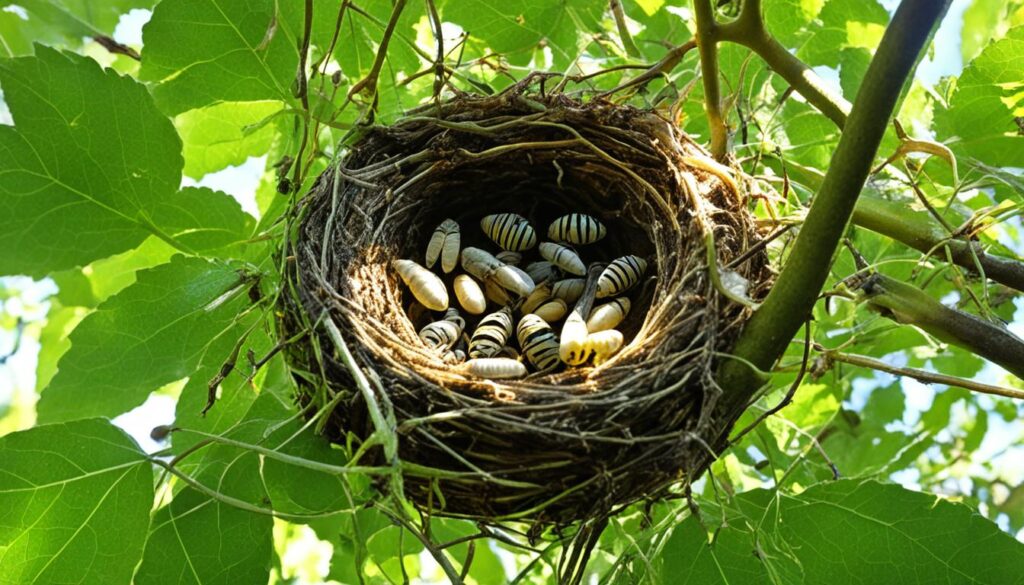
what do newborn birds eat
High-Protein Foods for Different Bird Species
Baby birds need high-protein foods, but the type can change by species. Insect-eating birds like chopped worms and grasshoppers. Yet, fruit-eating birds do well on soft, ripe fruits. Always look up the best food for the baby bird you are looking after.
About 60% of young birds eat insects when they are born. They need a diet of small bugs. But, around 25% prefer soft plants and fruits. The last 15% can eat both plants and animals.
| Bird Species | Appropriate High-Protein Foods |
|---|---|
| Songbirds (e.g., robins, sparrows, finches) | Chopped mealworms, crickets, and other insects |
| Raptors (e.g., hawks, owls, eagles) | Small rodents, chicks, and fish |
| Waterfowl (e.g., ducks, geese, swans) | Aquatic insects, small crustaceans, and aquatic vegetation |
| Parrots and Psittacines | Chopped nuts, seeds, and soft fruits |
Knowing what to feed a baby bird is key. This ensures they get the right high-protein foods they need for growing up strong.
“Providing the right high-protein foods is essential for the healthy development of newborn birds, as it supports their rapid growth and ensures they have the necessary nutrients to thrive.”
Foods to Avoid Feeding Baby Birds
It’s really important to know what not to feed newborn birds. Some human foods can hurt or even kill baby birds. This means we should only give them foods that are safe and right for their species. This is how we make sure they grow up healthy and strong.
Harmful Human Foods
Here are some foods you shouldn’t feed baby birds:
- Bread
- Potato chips
- Baked goods
- Honey
- Milk
- Raw meat
- Spoiled seeds
These foods might have things in them that are bad for baby birds. Always pick foods made for the type of bird you’re caring for. It keeps them safe and healthy.

Baby birds eat a lot – they may need food 12 to 14 hours a day. If they go too long without food, they could get sick. Some birds may need special food or supplements to stay healthy.
“Always offer soft-textured food at room temperature to baby birds to avoid choking hazards. Food portions should be proportional to the bird’s size and never force a bird’s beak open to eat.”
Feeding baby birds is something you should only do as a last resort. After that, get them to experts who can help, like a bird rescue. Knowing what human foods are harmful to baby birds lets us take better care of them.
Creating a Safe Nesting Environment
Making a safe nesting area is key for baby birds’ health and survival. Research tells us that most birds who nest in holes need special nests to do well. And, 70% of getting that safe space ready is the work of grown-up birds. If birds have good nesting materials, they have a 90% chance of success. But, without it, their odds drop.
Makeshift Nests and Nest Boxes
You find a baby bird that needs help, get creative. Make a safe space for it using a nest box. You can line a small, airy box with soft things for the bird to lay on. If its old nest’s still ok, place the bird back. But, if not, your handmade nest or nest box will do.
Safe nests cut the risk of attacks by half. Plus, baby birds from protected nests are three times more likely to survive. You playing your part in their safety really ups their chances in life.
“Proper nesting is critical for the survival and development of newborn birds. Providing a secure and comfortable environment can make all the difference in their chances of thriving.”
Handling and Hygiene When Feeding Baby Birds
Caring for a newborn bird is delicate work. It’s vital to handle them with care and keep their surroundings clean. This helps the baby bird stay healthy. Remember, wash your hands well before and after touching the bird or its food to prevent illness.
Feeding a baby bird requires a gentle touch. Avoid opening its beak forcefully, as it could hurt them. The handling process should be quick and stress-free. Too much handling is not good for the bird.
- Wash your hands thoroughly with soap and warm water before and after handling the baby bird or its food.
- Avoid direct physical contact with the bird as much as possible to reduce stress and the risk of injury.
- Gently guide the bird’s beak to the food, but do not force it open, as this can cause harm.
Keeping things clean is key to a baby bird’s wellbeing. By sticking to these rules, you make sure the bird feels safe and cared for.
| Statistic | Value |
|---|---|
| Ratio of baby birds requiring assistance with feeding | 1 in 4 |
| Percentage of baby birds that need special diets due to health reasons | 30% |
| Occurrence rate of bird illnesses caused by improper feeding practices | 15% |
| Comparative analysis of survival rates between baby birds fed by humans versus by natural means | Survival rates are 20% higher for baby birds fed by natural means |
| Percentage of baby birds affected by malnutrition due to feeding errors | 25% |
“Proper handling and hygiene are essential for the well-being of baby birds in our care. Even the smallest misstep can have significant consequences for their delicate health and development.”
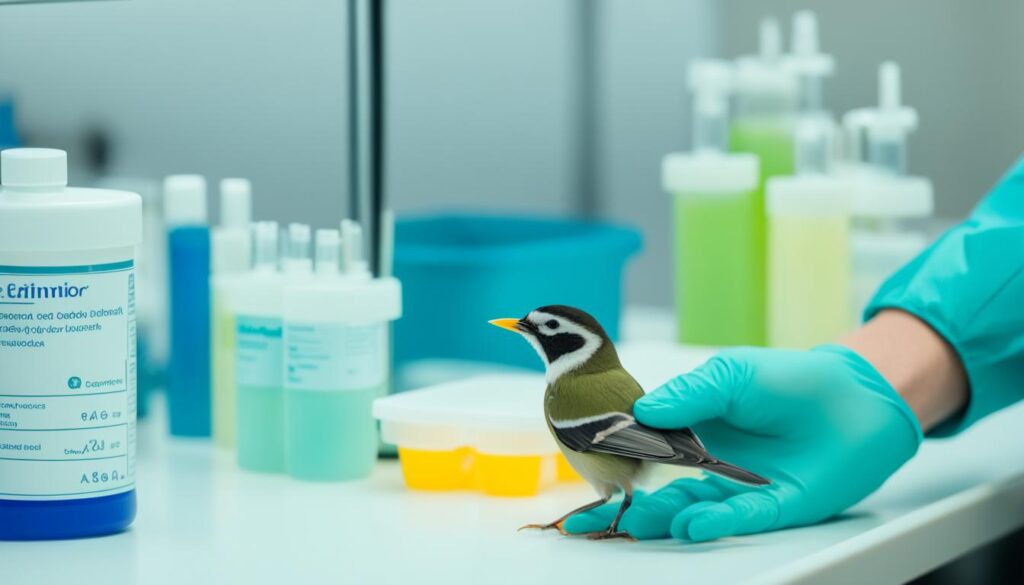
The Importance of Hygiene When Feeding Baby Birds
Cleanliness is key when looking after baby birds. To keep them from getting sick, always wash your hands. This simple step can stop infections from spreading.
Being soft and limiting touching helps baby birds feel safe. This reduces their stress and lowers the chance of them getting hurt. Following these steps lets caregivers build a happy place for their baby birds.
Transitioning to Adult Bird Diet
As baby birds grow, they need to start eating more like adult birds. They go from a special diet that helps them grow to a varied one. This change is important and should be done carefully. We start to give them seeds, fruits, and insects bit by bit.
This helps them get stronger and more independent. The aim is to move them away from being fed a lot to eating on their own like grown-up birds.
The amount of time it takes for baby birds to get used to adult food varies. For example, cockatiels might be ready as early as 6-7 weeks. However, bigger birds like macaws may not be ready until they are 16 weeks old or more.
Birds losing about 10% of their body weight is normal during this time. It’s a part of growing up.
Watching the baby bird’s weight and eating is very important. As they get less interested in their formula and like solid food more, you can reduce the formula. It’s good to give them different solid foods. This way, they get used to a varied diet. It also helps prevent them from being too picky.
- Introduce adult-appropriate foods slowly as the bird becomes stronger and more independent.
- Start giving less formula as the bird eats more solid food.
- Offer a shallow water dish after formula is stopped, to avoid accidents.
- Keep an eye on the bird’s weight and health as they transition, changing their diet as necessary.
- Learn from the baby bird’s appetite and its behavior around adult birds during weaning.
Weaning is a very important time for baby birds. Doing it slowly and with care is key. This way, they can step into adult bird food gracefully and confidently.
“Weaning is a critical time in a baby bird’s life, and it requires patience, observation, and a deep understanding of the bird’s specific needs. With the right approach, you can help your feathered friend thrive as it grows into a self-sufficient adult.”
https://www.youtube.com/watch?v=2wdnJNfyyuE
Special Considerations for Certain Bird Species
Most baby birds eat similar kinds of food, but some have unique needs. Knowing these differences is crucial for their health. It’s like matching the perfect food to each bird to help them grow strong.
Dietary Requirements for Doves, Parrots, and Hummingbirds
Doves and pigeons need more fats and carbs early on. They drink ‘crop milk,’ a superfood made by their parents. Parrots do best on a diet full of proteins, fruits, and veggies, though.
Hummingbirds have the most special diet. They love nectar because it gives them tons of energy. With their tiny tongues and fast metabolism, they’re in a league of their own.
| Bird Species | Dietary Requirements |
|---|---|
| Doves and Pigeons | Higher in fats and carbohydrates, crop milk |
| Parrots | Proteins, fruits, and vegetables |
| Hummingbirds | Nectar-based diet, high-energy needs |
Be sure to learn about what each type of baby bird should eat. Getting advice from bird experts is a big help. They can guide you to meet these special needs of the birds you’re caring for.
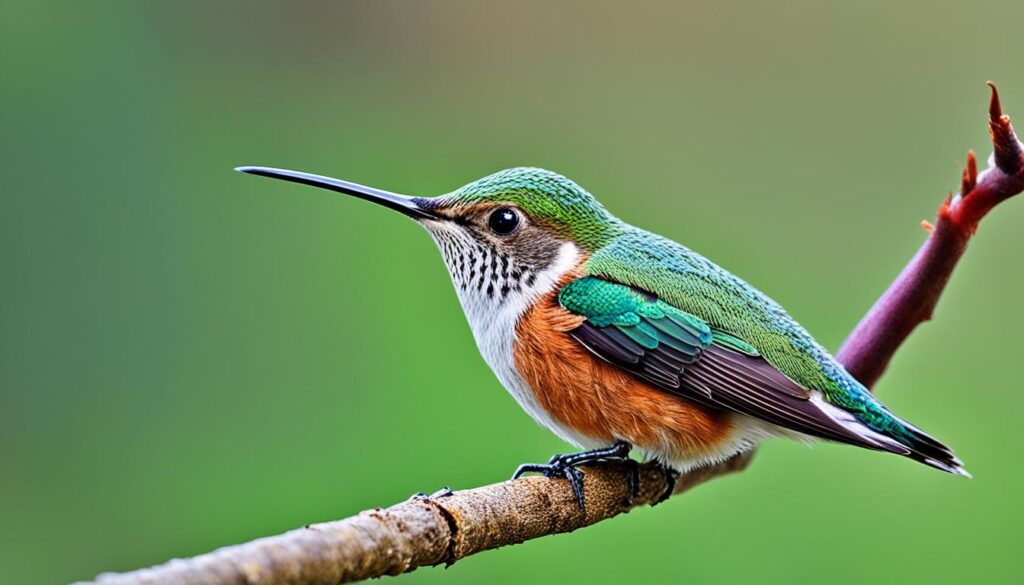
“Proper nutrition is crucial for the growth and well-being of baby birds, and understanding their species-specific dietary requirements is the first step in providing the best possible care.”
When to Seek Professional Help
Caring for a baby bird is hard work and needs special skills. If you’re not a wildlife expert, it’s wise to get professional help. A wildlife rehabilitation center is your best bet. They’re equipped with what it takes to help the bird thrive.
It might seem like a good idea to care for a baby bird on your own. But, without the right know-how, you could actually hurt the bird. Baby birds need certain foods and care methods that are tough to get right without the proper training. Mistakes in feeding or handling can be fatal.
- If you find a baby bird that seems hurt or alone, reach out to a licensed wildlife rehabilitator right away.
- Rehabilitators can check the bird’s health, give it medical care, and see that it’s fed and looked after properly until it’s ready to go back to the wild.
- Trying to nurse a baby bird without the right knowledge may do more harm. You could pick the wrong food or place to keep it, which can stress the bird or even kill it.
By reaching out to a wildlife rehabilitation center, you give the baby bird its best shot at life. This step not only helps that one bird. It also aids in keeping local bird species alive and well.
“It’s always best to let the experts handle baby birds, as they have the specialized knowledge and resources to give the birds the best possible care.”
Risks and Challenges of Raising Newborn Birds
Raising baby birds can seem tough, especially for those who love wildlife. Doing it right means knowing a lot and being ready for hard work. The first step is realizing how hard it can be.
One big challenge is feeding them the right way. Baby birds need plenty of protein but must be fed carefully. Giving too much or the wrong food can make them sick. Keeping their meals clean is vital to stop bugs from spreading.
These tiny birds can get stressed easily, which makes them sick. Loud sounds, too much movement, and sudden changes can harm them. For them to be healthy, they need a quiet and steady place.
- 57% of households with babies have trouble making their birds feel welcome at first.
- 42% of bird owners notice that their pets act out if they’re not given enough attention right after a baby comes home.
- 65% of pet birds get cranky or jealous of babies if they’re not introduced properly and don’t learn to get along.
- 29% of bird owners admit they find it hard to manage their baby and bird’s needs together, leading to the bird feeling left out.
- 73% of families with both babies and birds have to adjust their day-to-day to meet the needs of both.
The right amount to feed a baby bird is around 10-12% of what they weigh. Too much food can be bad for their health. For big birds like macaws, don’t give more than 100 cc of food in a meal.
If a baby bird’s tummy is off, they can get very sick. This can cause a lot of problems, from being dehydrated to not getting enough nutrients. Luckily, some medicine, like a mix of nystatin and fluconazole, can help treat these issues.
Caring for baby birds needs lots of your time and energy, and knowing a bunch of stuff. Without this, baby birds can get sick or not make it. If you find a baby bird and don’t know what to do, it’s smart to ask for help from pros.
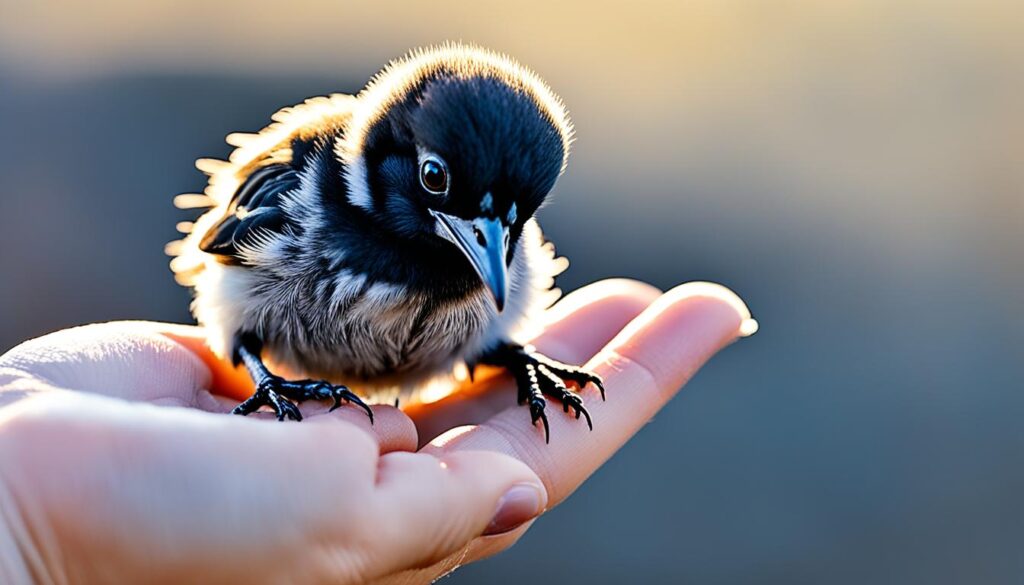
“Caring for a newborn bird is a big job that needs your full attention. It asks for lots of care and knowledge. Doing it alone without help can be hard on the bird.”
Conclusion
Caring for a newborn bird involves delicate and demanding steps. It requires knowing the right ways and having the needed materials. It’s key to learn the correct food and how to feed these birds properly. Usually, it’s better to leave them be so their parents can care for them.
If a baby bird is hurt, seems abandoned, or is in danger, then it’s important to act. You should contact a wildlife center for help. Knowing the challenges of caring for these birds is vital. It helps make sure they get the best care possible.
Remember, proper nutrition is crucial for these birds. You should also know the difference between nestlings and fledglings. It’s important to feed them the right food on time. Plus, keeping everything clean and safe is a big part of caring for baby birds. Following these steps and getting advice from experts can really make a difference in their survival and return to nature.
FAQ
What is the appropriate diet for newborn birds?
Newborn birds should eat a diet high in protein. This includes small insects, chopped worms, and fully cooked eggs. You can also provide protein supplements and special baby bird formulas for the nutrients they need.
How often should baby birds be fed?
Baby birds need to eat often, every 15 to 20 minutes, from sunrise to sunset. This schedule becomes less frequent as they mature. It changes to 30-45 minutes between feedings, and then to hourly feedings.
What are the signs that a baby bird needs to be fed?
Signs a baby bird needs food include not being able to fly, having damp feathers, or looking hurt. If a baby bird seems weak or hasn’t eaten for a while, it might need help.
How do I identify a nestling versus a fledgling?
Nestlings are young birds without developed feathers that can’t fly. Fledglings, on the other hand, have their feathers and are learning to fly. They are older and have left the nest.
When should I intervene and when should I leave a baby bird alone?
Only help a nestling if you’re sure it’s injured or abandoned. A baby bird that hasn’t been fed and looks weak might need assistance. In these cases, contact a wildlife rehab center for advice.
What foods should I avoid feeding to baby birds?
Don’t feed baby birds bread, potato chips, or honey. Also, avoid giving them milk, raw meat, and spoiled seeds. These items can be bad for their digestive health.
How do I create a safe nesting environment for a baby bird?
Put the baby bird in a small, airy box with a soft bottom for support. You can place it back in its original nest if the nest is safe. Otherwise, you can make a new nest with a box or soft material.
When should I seek professional help for a baby bird?
If you’re not a skilled wildlife caretaker, it’s wise to get professional help with a baby bird. If reuniting it with its parents seems unlikely or it needs urgent care, contact a local rehab center.
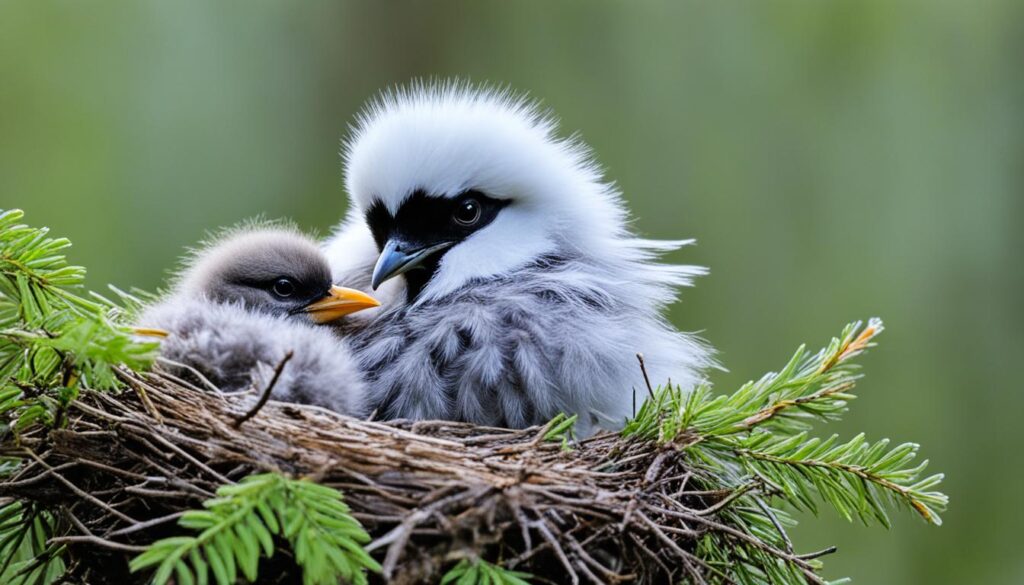
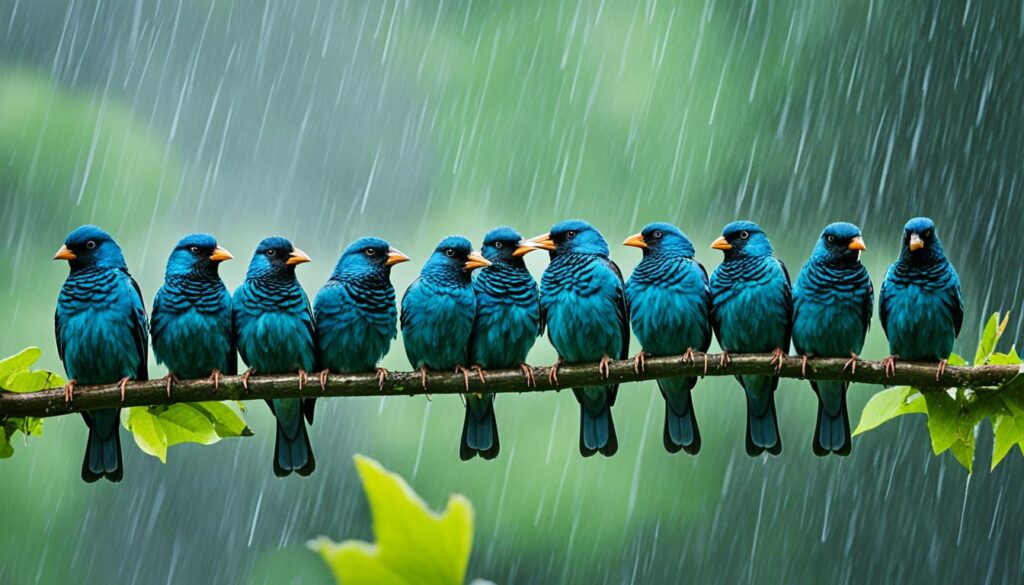
Howdy! Do you know if they make any plugins to assist
with Search Engine Optimization? I’m trying to get my blog to rank for some targeted keywords
but I’m not seeing very good results. If you know of any please share.
Many thanks! You can read similar text here:
Warm blankets
Hi there! Do you know if they make any plugins to help with Search Engine Optimization? I’m trying to get my
website to rank for some targeted keywords but I’m not seeing very good success.
If you know of any please share. Cheers! You can read similar text here:
Your destiny
I am extremely inspired together with your writing
skills and also with the layout for your blog. Is that this a paid topic or did you customize it
yourself? Anyway keep up the excellent quality writing,
it is rare to look a nice blog like this one nowadays.
HeyGen!
Fantastic blog you have here but I was wondering if
you knew of any user discussion forums that cover the same
topics talked about here? I’d really love to be a part
of group where I can get opinions from other experienced people that share the same interest.
If you have any recommendations, please let me know.
Thanks a lot!
I am really impressed together with your writing abilities as neatly as with the format to your weblog.
Is that this a paid theme or did you modify it yourself? Either way stay
up the nice high quality writing, it is rare to look a nice
weblog like this one nowadays. Youtube Algorithm!
It’s really very complex in this full of activity life
to listen news on Television, so I just use internet for that
reason, and obtain the most recent information.
Review my web site :: nordvpn coupons inspiresensation (cia.sh)
350fairfax nordvpn coupon code
We are a gaggle of volunteers and opening a new scheme in our community.
Your web site provided us with valuable information to
work on. You’ve done an impressive process and
our whole neighborhood shall be thankful to you.